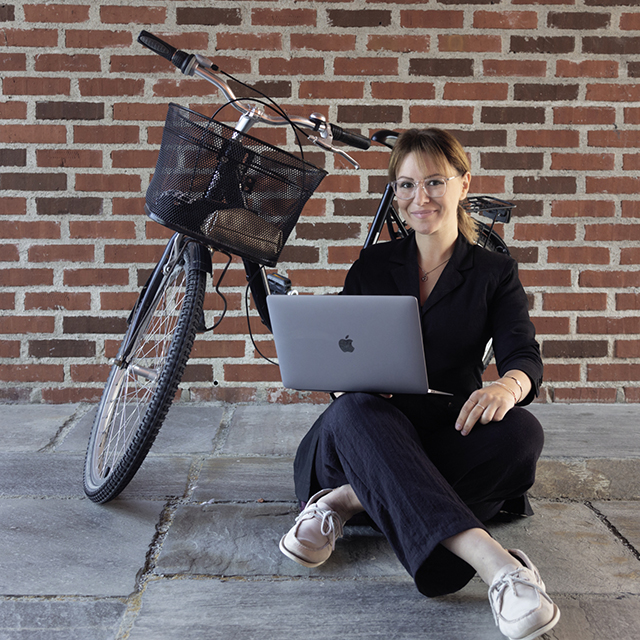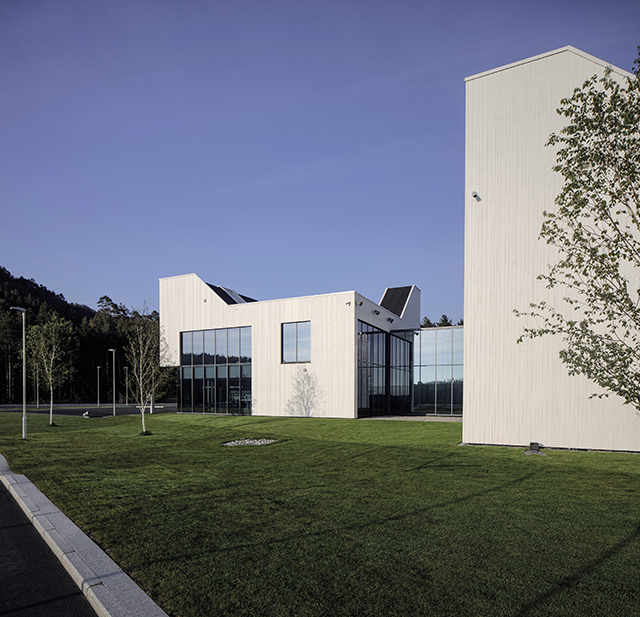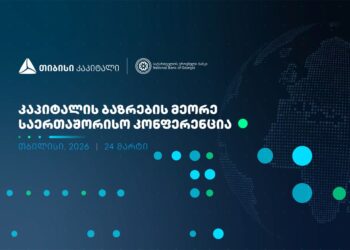Mariana T. Eiane is a Research and Development manager for Norwegian-American biotech company Diagnostrix. Before moving to Norway, Mariana successfully led businesses in the healthcare, pharmaceutical and hospital management industries in Georgia. She is interested in innovations and solutions with high purpose and societal meaning.
She is also fascinated by nature and humanity, and considers her volunteering activities, often involving caring for children, elderly and minorities, very important. She tells us a medical profession is a humbling profession, and that she loves meeting new people who believe that it is with their own actions and decisions that they contribute to making essential changes in the world.
As a leader and as a team-player, she discourages groupthink and encourages originality and accountability. And in business, she believes that honesty towards partners and customers, even towards one’s self, is as important as having a clear aim, accompanied with a relevant strategy.
GEORGIA TODAY asked Mariana to tell us more about herself and her inspiring beliefs.
“I’m originally a medical doctor, coming from a family of many generations of doctors committed to their profession, their patients, and to continued self-improvement. I grew up in a world of medicine and my decision to become a doctor was driven by values instilled in me by my family. I’d always had an interest in applying new scientific knowledge and discoveries to improve human health in some way. But I also knew that organizational, analytical and strategic skills were my real strength. A medical degree was more of a pathway to where I was going. A special appreciation for visual and performing arts was also a part of the environment I grew up in. Even now, I don’t consider a day fully inspiring if I don’t pop by the new exhibition in the local museum or discover a new piece of art I didn’t know about before. I’m a symphonic music enthusiast, everyone in my family played a musical instrument, as they do in many Georgian families. Art is the best food for the soul. Studies suggest that listening to classical music can trigger even more physiological benefits than decreasing cortisol levels and lowering blood pressure; it can also increase the release of the feel-good neurotransmitter dopamine in your brain.
“Growing up in the middle of a city center, we spent every weekend at our cabin in the middle of the forest. I’m used to the combined lifestyle: I love the noise of big cities and I also love getting lost in the silence of nature.
“Within the family, I was known to be the stubborn, utterly independent thinker, who would not let anyone influence her mind. From my early years, I was captivated by the idea of finding my own path, seeking no comparison to others but only constant growth and self-improvement.”

Tell us which character traits you think shaped you most as a human and professional.
When I was 12, I moved to Germany to study, unafraid that I didn’t know the language or what to expect. Independence is a trait that is dominant in my character. I love to work in groups but I need to be given space for independent thinking. I don’t like using popular words and ways or premade conclusions or stereotypes. I’m also the type who thrives best in constant change. Sometimes it’s hard for others to understand my desire to always seek change, but it is beneficial for business, as the confluence of conditions necessary to sustain business are ever-changing.
I like to think independently. In the medical university, the lecturer once wrote down an equation of formulas for us to solve. I started staring at the chalkboard and calculating in my mind. She asked me to take a pen and paper and write like the other students. I refused, saying I already had the answer. My answer was right. I still remember the surprise on her face. The lecturer then asked me to present the way I solved the equation. Soon I found out that the way I used to solve the biochemical equity was not the original way that she expected or had thought about. It was an alternative way. To me the alternative way was the one that others had used to get to the same answer. There are so many perspectives, ways how the mind works. The beauty of us lies in our uniqueness and in the same time in the similarities we share as human beings. Industries are made by humans. That is why I like to emphasize the importance of human resources in the companies I work with. I strongly stand for diversity, and love welcoming new, interesting people. The way that others welcome me when I am new in an environment tells me lots about their personalities too.
After obtaining a medical doctor degree from Tbilisi State Medical University, I diversified into pharmaceutical business management as it was the new, fast evolving industry by that time. I wanted to experience the pace of it. I started within pharmaceuticals in a variety of roles, spanning strategy, sales, regional management and country management. Later, I moved to study Hospital Management and worked with Georgia´s largest multi-profile clinic. During summers, I often worked in several other industries in order to learn more about the processes that were useful in my field. I worked for a logistics company for two months, for an IT company, and so on.
I was first interviewed by GEORGIA TODAY in 2013, when I represented Georgia at the world’s first medical tourism conference and exhibition. I love innovations, new perspectives, new challenges, but I also learned to take a step back when needed, which is called being realistic. Georgia still has a long way to go in order to be able to deliver world-class healthcare. The healthcare industry of today in Georgia is in huge need of crucial improvements. The first and foremost challenge is that the industry is almost fully privatized. There is no social system that is focused on treating each and every patient equally. People with acute, life-threatening conditions rely on private funds acquired through Facebook posts. This is heartbreaking. There are some fundamental aspects to be addressed and one of them is the absence of equal, public healthcare.
The biotechnology industry works to develop innovative products to improve health outcomes. Tell us about the contribution of the company you’re working with (Diagnostrix) in these processes.
Biotechnology is an innovative, interdisciplinary field that impacts many different sectors, including agriculture, veterinary, medicine, pharmaceutical and fine chemicals production. Medical biotech offers patients a variety of new solutions, among them unique, targeted and personalized therapeutic and diagnostic solutions for particular diseases or illnesses. For more than thirty years, the biotech industry has made extraordinary advances in both therapeutics and business.
I am delighted to have joined Diagnostrix. The people I work with and meet daily are result-driven, down-to-earth professionals with a track record of creating meaningful innovations, investments and excellent success history. I do enjoy when I’m not the smartest one in the room, so where I am now is a good place to be. Together, we’re developing a product called Endimetirx. It is a saliva based, non-invasive and affordable test assay for endometriosis. The test will reduce the time needed for endometriosis diagnosis from 7 years to a few hours and improve the diagnostic method from invasive (laparoscopy) to non-invasive. The innovation will revolutionize the primary healthcare services in reproductive healthcare through creating access to early endometriosis diagnosis, leading to improved quality of life.
You are one of the few women working in Biotech. What can you tell us about involvement of women in this process?
Women have played a fundamental role in biotechnology, including Margaret Dayhoff, who developed the field of bioinformatics; Janet Mertz, who created the first piece of recombinant DNA; Jennifer Doudna and Emmanuelle Charpentier, who helped pioneer CRISPR, a revolutionary technique for genome editing; and Rosalind Franklin, who played a fundamental role in deciphering the structure of DNA. The innovation we are commercializing belongs to an incredible woman too: Dorothee Goldman, an inventor of four issued patents for diagnosing fertility issues, including endometriosis. Her genuine curiosity, knowledge in biology and dedication to improving people’s lives led to the discovery of the theory behind Endimetrix.
Numerous studies show that a female presence on the job market, especially in leadership positions, is growing. Research has found that companies with the best gender representation on their boards also generate a significantly higher return on sales and equity than those with few or no women. Although the recognition of women in the Biotech market is growing too, there is still a long way to go. I believe that a gender-balanced workplace is important for assuring the biotech industry achieves revolutionary breakthroughs. The populations we serve are diverse, and our industry should reflect that.
However, making significant change requires shifts in behaviors, perspectives, and processes, and that takes time. Improvement can happen if CEOs and boards consider an inclusive work culture a priority. In return, they will benefit by encouraging talent retention and keeping the workforce competitive.
Above I told you a story about me solving the biochemical equity, I forgot to mention to you, that after that day, the lecturer often referred to me as having a “man’s brain”. At school, I often heard that “Mariana has man’s brains” comment. They obviously meant smart with that, or at least I hope they did.
I must add that it is not only men who create the stereotypes for women. There are women who think that business in general is for this insensitive, strong, power seeking women and there is no place for the highly sensitive, empathetic types. Our industry as all the other industries are made by people for people, for the sensitive, for introverts as well as extroverts and for empaths, as well as for those with less empathetical capabilities. We are all vulnerable in different ways. Women who are not afraid to be vulnerable and real are more interesting to me to work with than the insensitive type constantly focusing their energy and time on trying to seem strong. The strength is in honesty and in being real. It is the same in business as it is generally in life. In fact, studies have shown that highly sensitive personalities (HPSs) have more active mental circuitry and neurochemicals in areas related to attention, action-planning, decision-making, and having strong internal experiences. In other words, you have a deep capacity to channel your focus with precision, make thoughtful choices, and spark rich insights to bring great ideas to the table. I belong to the highly sensitive type, and always want to encourage women who think that they are too sensitive to do business, to actually do it. They will be outstanding in their soft people skills and decision-making abilities.
How is women’s health perceived today and what challenges are we facing?
Interestingly, it is not only the biotech job market where women are less recognized. For most of documented history, women have been excluded from medical researches too.
Diseases presenting differently in women are often missed or misdiagnosed. Even in developed nations, attention has been skewed toward the impact of disease in men. For decades, cardiovascular disease was considered a “man’s illness,” despite statistics telling a different story. Endometriosis patients are often viewed by their treating doctors as exaggerative or mentally unstable. Pelvic pain associated with endometriosis or fibroids can be dismissed for years as a ‘normal’ part of the menstrual process before being correctly diagnosed. Sexism has underpinned medical practice since the time of Hippocrates. “Hysteria”—from hystera, the Greek word for uterus—was long used as a blanket diagnosis for women. In the 1870s, the concept became a reason to remove their ovaries.
“The American Autoimmune Related Diseases Association found that more than 40% of women eventually diagnosed with a serious autoimmune disease have been told by a doctor that they’re just too concerned with their health or they’re a hypochondriac”.
Many of the delays and misdiagnoses affecting women can be traced back to how doctors and other health professionals are educated about women’s health. The problem of delayed and missed diagnoses is even worse for women of color.

Photo credit: Sindre Ellingsen
The main goal of Diagnostrix is to develop a novel, saliva based diagnostic system for endometriosis, and the first test kits have already been developed. Could you explain why endometriosis is such a big problem among women and what makes your company’s approach so unique?
Endometriosis affects 1 in every 10 women of reproductive age, and can have a profound impact on women’s lives, including associated pain, infertility, decreased quality of life, and interference with day-to-day activities, relationships, and even livelihood.
It is a condition where tissue similar to the lining of the womb starts to grow in other places, such as the ovaries and fallopian tubes. It’s a long-term condition that can have a significant impact on the quality of life. There is no cure for endometriosis, symptoms can only be managed, but there are ongoing studies to find aimed treatments. However, in order to seek treatment, there has to be a correct diagnosis at first. As symptoms are non-specific, a differential diagnosis is often needed.
It takes around 7 years in Norway to get an endometriosis diagnosis and even more time is needed in other countries. Correct diagnosis of endometriosis requires surgical intervention, known as a laparoscopy, where a biopsy is performed and the affected tissue is examined under a microscope.
Our company’s approach is unique, as we are developing a non-invasive, saliva based, affordable test. Endimetrix stands apart in that it is simpler and does not require specific lab-based equipment. It can be administered in a physician’s office, or even by an individual at home.
During the time needed for diagnosis today, the disease advances, causing complications such as infertility. About 25 to 50% of infertile women have endometriosis, and 30 to 50% of women with endometriosis are infertile (1). A large-scale research by Endometriosis UK found that 50% of women with endometriosis have considered suicide (2). Another study shows that women who have endometriosis miss 20 days a year at work and are less productive (3). There is an economic burden associated with endometriosis too. Endometriosis is not only women’s health problem; it is a social problem.
In his interview with a Norwegian broadcaster in April 2021, Norway’s health minister Bent Høie addressed endometriosis and apologized to women for the lack of acknowledgement they have been experiencing in the healthcare system. Some of the political parties included endometriosis in their action plan for the upcoming election. This is a good example for recognizing endometriosis as a social disease, the same steps were taken by the Australian and Italian governments earlier. Also, the European Commission included prevention of endometriosis in its Community Action Programs for Public Health to allow more research into the causes, prevention, and treatment of endometriosis. The importance of access to early diagnosis and effective treatment of endometriosis is also acknowledged by the WHO.
What was your support system like as you advanced in your career? Did you have a particular role model?
My daughter and husband are my support system. They celebrate success with me and guide me through the challenges. My husband is an economist, and his strategic planning skills and knowledge give me great confidence, especially in turbulent times. I have to say my 13-year-old daughter is sometimes wiser than all of us together, and I take no credit for it. She is a well-developed individual, who dreams of being a human rights lawyer and protecting the interests of minorities. I really like her, she is independent, analytical and compassionate. The women in my family are my ultimate role models. I always look up to women around me, I get inspired by meeting women who are smart, real and caring. I grew up with a role model of an independent, fierce and highly professional woman. My mom and both of my grandmas were extremely successful in their careers and at the same time they were good parents, grandmothers, wives, sisters and friends. My mother is a OB/GYN and also a radiologist, my grandmother was OB/GYN too who led a maternity hospital. Another grandma, a director of a public school, was intensively involved in the educational processes in the country. They taught me how to be myself, use my voice and be authentic. Their belief that I mattered gave me great confidence in whatever I was doing. The woman that inspired me most after moving to Norway was my mother-in-law. She was exceptional, and I felt honored to get to know her. We shared much in common, especially the love and care for children. She was my supporter, we had an interesting, distinct connection, even though my Norwegian language knowledge in the beginning was quite limited. In the humanistic perspective, which is a side I am grateful for, I consider my late father to have had an impact on me. A doctor himself, he had higher moral standards and IQ than anyone else. We shared a sense of humor too.
How do you see the future in terms of diagnostics and curing endometriosis in the country you’re working in, Norway, and worldwide, in general?
Well, medical innovation is key to improving healthcare systems for endometriosis both in Norway and worldwide. Medical researchers are achieving new milestones that once seemed unattainable. Continued investment in medical innovation will lead to new advancements, strengthen the productive biotech/bioscience industries, and ensure that patients are at the center of these efforts. Eventually, endometriosis will not be a silent disease anymore. Women with pelvic pain will be taken seriously and will be offered an instant, simple diagnosis and aimed treatment. That will lead to improved quality of life for them and the societies around them. Norway can be the country where the change will actually come from as we are a partly Norwegian company.
Early diagnosis is extremely important to make a change, to avoid infertility, keep women in the workforce, and contribute to the emotional wellbeing of girls, women and families.
Endimetrix will create access to early diagnosis, which will open completely new possibilities for finding aimed treatment solutions too, culminating in earlier effective management. GPs have a key role in early diagnosis of endometriosis. We will work on educational and informational campaigns too, to share the knowledge we obtained about endometriosis and educate doctors in the use of our new technology that they and their patients will greatly benefit from. Endimetrix is a diagnostic tool that has a global meaning, as endometriosis affects 1 in every 10 of us, equally, in all the different parts of the world.
Tell us about the company’s distinguished achievements and success stories.
I would like to address this question to Mrs. Goldman who will be joining us shortly for a comment.
Dorothee Goldman: “Diagnostrix is a joint venture between Biolink AS and Oratel Diagnostics that began with meeting via Google in 2008. Our respective companies combine our joint passion to improve global sustainability and generate affordable solutions for unsolved health issues in women by combining the unique expertise of our respective companies into a compatible business model that will allow for global distribution of our easy-to-use Endimetrix assay which allows women all over the world to learn whether or not their pelvic pain is due to endometriosis.
“Endometriosis affects about 10% of all women in their child bearing age (190 million. Current Health costs are about 9579 Euro/woman/year. At present, there is no affordable way to diagnose endometriosis. Diagnostrix can mitigate this unmet health issue with our new Endimetrix saliva assay for endometriosis. This is a simple swab treated with proprietary pigments that, when exposed to saliva for less than 5 seconds, will generate a color response that is digitally analyzed by our proprietary testing system. The assay can be used anywhere in the world and allow women to connect digitally to experts and services who can provide guidance on treatment options. This will help all women better understand their fertility issues and allow easier access to both new therapeutics and fertility services. In the end, this can save the healthcare system billions of Euros and improve the lives and fertility of millions of women.
“Our path to success has achieved the following milestones:
• 2010-2014: Four issued patents valid in the EU, US, and Canada until 2030.
• 2017: Awarded participation in the Grants 4 App program at BAYER. Ran clinical study on 105 saliva samples to evaluate for presence or absence of endometriosis in women receiving concurrent laparoscopy. Results demonstrated 92% specificity and 86% sensitivity in clinical study contracted with Brigham and Women’s Hospital (Harvard).
• 2018: Awarded services for pre-market regulatory strategy by CTIP which was performed by Cambria Consulting.
• 2019: Received HITLAB Women’s Health challenge 3rd Prize for free consulting services.
• 2019 Received $30,000 from CTIP to partner with Dr. Stacey Missmer to evaluate current app on saliva samples from 200 women enrolled in a study conducted at Brigham and Women’s Hospital.
• 2020: HITLAB and Oratel Diagnostics collaborated in joint study to learn what issues doctors and nurses face for diagnosing endometriosis in a post COVID-19 world.
• 2020: Product development partnership with Diagnostrix for development of production line for assays and field use evaluation.
• 2021: Awarded Medical Device Innovation Challenge for mentoring in commercial strategy and regulatory advice with Syracuse University Innovation center.”
What are the company’s future plans?
Our aim is to make endometriosis diagnosis affordable and highly accessible, without the need for surgical procedures and delays. To achieve that aim, we plan to make Endimetrix accessible for women and girls worldwide. We hope to receive good support through funding channels for the clinical research, and to continue collaboration with the National Institute of Health in the US in order to contribute building healthier, much more productive societies. Other countries that are addressing endometriosis at a national level with existing action plans are welcome to participate.
(1) https://www.ncbi.nlm.nih.gov/pmc/articles/PMC2941592/
(2) https://www.womenshealth.com.au/endometriosis-suicide
(3) https://www.jmcp.org/doi/pdf/10.18553/jmcp.2017.23.7.745














